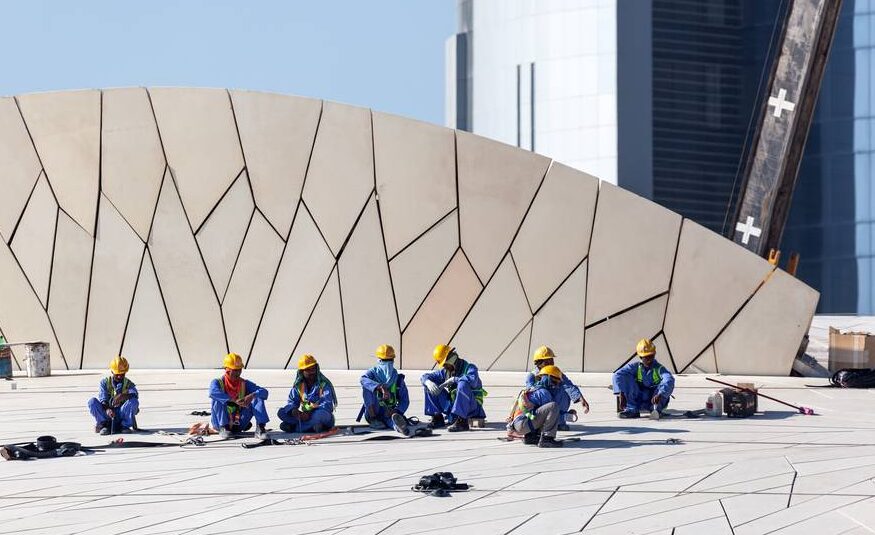
The Gulf Cooperation Council (GCC) countries – Bahrain, Kuwait, Oman, Qatar, Saudi Arabia, and the United Arab Emirates – stand as pivotal hubs for global labor migration. Migrant workers, constituting a substantial portion of the workforce, form the labor backbone of sectors like construction, hospitality, and domestic work, driving the economic engine of the Gulf region.
In 2010, Qatar was awarded the 2022 FIFA Men’s World Cup, necessitating massive infrastructure development in the country and resulting in the recruitment of millions of workers from South Asia and, increasingly, East and West Africa.
According to estimates, Nepali migrant workers make up 12.5% of Qatar’s entire population. Nepal’s economy is heavily dependent on outward labor migration, with remittances making up almost a third of the country’s GDP. The Arab Gulf States are a major destination for Nepali migrant workers, hosting 65% of all Nepalis who migrate for work outside of Nepal and India.
The experience of aspiring Nepali migrant workers seeking employment in Qatar typifies the journey many labor migrants make between their homes and Gulf countries. Migrant workers often rely on recruitment agencies to connect them to overseas employers, as well as labor brokers, who serve as intermediaries between workers and recruitment agencies. Recruitment agencies and intermediaries routinely charge excessive and illegal recruitment fees for access to jobs, pressuring workers to take out high-interest loans, sell property, or borrow money. Once in their destination country, it is common for employers to seize passports and engage in contract substitution, where a worker’s job description, working hours, and remuneration may be significantly altered from the original offer. Wage theft is also rampant, and without effective mechanisms to change jobs or recoup their owed wages, many migrants find themselves in debt bondage, forced to either endure abusive working and living conditions for uncertain pay or return home in financial debt.
As recruiters and employers of migrant workers, construction and hospitality companies involved in preparations for the World Cup, including Western brands, bear a responsibility to respect the rights of migrant workers. Both sectors rely on heavily contracted, opaque value chains that shift responsibility for labor rights down the supply chain and profit from business models that fail to account for the true cost of labor. While the construction and hospitality sectors have generally escaped the scrutiny that has driven change in other global industries, the global spotlight and the weak regulatory landscape in the Nepal-Qatar migration corridor has attracted attention to practices in both sectors in recent years.
Humanity United’s Support to Grantees
Between 2014 and 2023, Humanity United has sought to leverage our grantmaking funds and strategic networks to create the conditions for safer labor migration between Nepal and Qatar. We have partnered with a wide range of actors, including migrant worker-led organizations, civil society groups and NGOs, journalists, policymakers, and the private sector.
Our aims until now have been to:
- Catalyze legal reform and regulatory action in Nepal and Qatar.
- Incentivize and pressure for changes in corporate behavior.
- Promote the leadership of migrant workers to speak out about the conditions they face.
To achieve this, we have supported human rights and labor organizations that raise awareness of conditions for migrant workers, inform policy advocacy and public interest litigation, and seek compensation and redress when abuses take place. We have worked with companies and academic institutions to better understand and influence the business models that perpetuate forced labor in the recruitment, construction, and hospitality sectors and to develop and propose solutions. We have also supported the efforts of migrant worker networks and leaders across the Gulf to advocate for policy change in their countries of origin and at the international level.
With limited local civil society or migrant worker-led organizations to advocate for legal reform and change in Qatar and the other GCC countries, we are engaged with regional and global advocacy organizations as well as worker-led organizations working to raise awareness of the experiences of migrant workers and the conditions they often face. For example, our contribution to Migrant-Rights.Org supports reporting on issues that migrant workers encounter throughout the Gulf as well as work to engage local youth and businesses on migrant rights. We also support Shramik Sanjal, an informal network led by migrant workers in the Gulf and Malaysia that aims to center the perspectives and lived experiences of migrant workers within policy and advocacy efforts to improve their conditions. We have also funded research aimed at informing policy change, like FairSquare’s Five Corridors Project on government responsibility to address recruitment-related abuses, which includes specific recommendations to governments in the Nepal-Qatar and Nepal-Kuwait migration corridors.